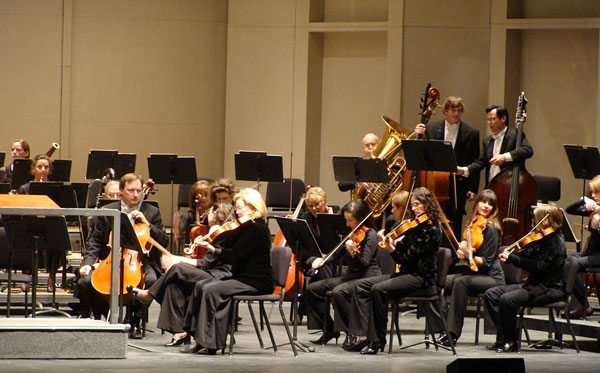
January 4, 2018; San Antonio Express-News and The Rivard Report
Not too many years ago, NPQ could almost have run a weekly feature on struggling orchestras and their often-related labor disputes and lockouts—there were that many similar stories in the first half of this decade. While those headlines have tapered off, news this week from the San Antonio Symphony underscores how fragile some of these cultural institutions continue to be.
On Wednesday, after a “marathon” board meeting, the Symphony Society of San Antonio trustees announced that the 2017–18 season will be suspended following this weekend’s concerts, which happen to be part of the city’s tricentennial celebration. That leaves the symphony’s musicians out of work, and cancels two-thirds of the season’s scheduled performances.
In many ways, the situation in San Antonio echoes those earlier reports: a standoff between the musicians and management over contract negotiations; a history of financial shortfalls (decades long, in this case); and perhaps a measure of magical thinking that somehow the show would still go on, despite obvious fiscal challenges.
One interesting variation on the theme in San Antonio is an attempt to transition board leadership of the symphony to a new nonprofit entity—Symphonic Music for San Antonio (SMSA)—formed last summer by a group of the symphony’s largest backers, including local supermarket chain H-E-B, the Tobin Endowment, and the Kronkosky Charitable Foundation. As reported in the San Antonio Express-News article, this coalition of funders “announced plans in July to take over the symphony’s assets and operations from the Symphony Society.”
However, as described last week in the Rivard Report, a “collapse of a transition agreement” with the new nonprofit further exacerbated the symphony’s fragile state:
Sign up for our free newsletters
Subscribe to NPQ's newsletters to have our top stories delivered directly to your inbox.
By signing up, you agree to our privacy policy and terms of use, and to receive messages from NPQ and our partners.
Instead of taking over as planned, the SMSA pulled out of a transition agreement on Dec. 21. In withdrawing, Thomas A. Stephenson, SMSA president and CEO, cited a potential Symphony Society pension fund withdrawal liability as a “deal breaker.”
Craig Sorgi, a Symphony violinist and Musicians of the San Antonio Symphony labor union negotiating chair, called the SMSA’s reason a “false excuse,” and has said that the withdrawal liability would not be incurred if current pension fund contributions were to continue.
In describing Wednesday’s board meeting, Symphony Society board chair Alice Viroslav said, “It was a tough night. We had a lot of very good, very thorough, very thoughtful discussion, but the symphony just doesn’t have the resources to move forward with the season.” She said it would take an additional $2.5 million to complete the season. Viroslav also issued a statement suggesting that cancelling the remaining 2017-18 concerts did not signal the end of the San Antonio Symphony:
To be clear, this is not the end of the symphony. As we observe San Antonio’s Tricentennial, it is the perfect time to recognize and celebrate the role that the fine arts have played in shaping our city, and to begin a true collaborative effort to firmly establish the symphony as the cornerstone of the arts in our community. It is our fervent belief that our city deserves nothing less than a world-class symphony.
No next steps have been announced by the board, and the musicians’ union has not ruled out legal action. The musicians will receive their final paychecks of the season following this weekend’s performances. At least in the short term, the people of San Antonio, especially its symphony’s subscribers and other supporters, will be left with far less than a world-class symphony; for now, they’ll have only the sounds of silence.—Eileen Cunniffe












